
IMMUNOLOGIC RESEARCH
Scope & Guideline
Connecting Researchers to the Heart of Immunology
Introduction
Aims and Scopes
- Cancer Immunotherapy:
The journal emphasizes research on various forms of cancer immunotherapy, including immune checkpoint inhibitors, CAR T-cell therapy, and novel vaccine strategies. - Tumor Microenvironment Interactions:
Studies exploring how the tumor microenvironment influences immune responses are a core focus, including the roles of various immune cells, cytokines, and signaling pathways in shaping tumor immunogenicity. - Mechanisms of Immune Evasion:
Research articles frequently address the mechanisms by which tumors evade immune detection and response, including the role of myeloid-derived suppressor cells (MDSCs), regulatory T cells (Tregs), and tumor-induced immunosuppressive factors. - Innovative Therapeutic Strategies:
The journal publishes findings on novel therapeutic strategies aimed at enhancing anti-tumor immunity, such as the use of combination therapies, oncolytic viruses, and engineered immune cells. - Biomarkers for Immunotherapy Response:
Research focused on identifying and validating biomarkers predictive of response to immunotherapy is also a significant theme, contributing to personalized medicine approaches in oncology.
Trending and Emerging
- Combination Immunotherapy Approaches:
There is an increasing emphasis on combination therapies that integrate multiple modalities such as immune checkpoint inhibitors, CAR T-cell therapy, and targeted therapies, aiming to enhance therapeutic efficacy and overcome resistance. - Personalized Immunotherapy:
Research focusing on personalized immunotherapy, including the identification of biomarkers for predicting treatment response and tailoring therapies to individual patient profiles, is gaining momentum. - Microbiome and Immunity Interactions:
Emerging studies investigating the role of the microbiome in modulating immune responses to cancer therapies are on the rise, highlighting the importance of gut health in treatment outcomes. - Metabolic Reprogramming in Immune Cells:
Research into how metabolic pathways influence immune cell function and tumor responses is trending, with implications for enhancing the efficacy of immunotherapies. - Use of Advanced Genomic and Cellular Technologies:
The application of CRISPR, single-cell sequencing, and other advanced technologies to dissect immune responses and develop next-generation immunotherapies is increasingly prevalent.
Declining or Waning
- Traditional Chemotherapy and Immunotherapy Combinations:
There is a noticeable decrease in publications focused on traditional chemotherapy as a standalone treatment, suggesting a shift towards exploring more innovative combination therapies that incorporate immunotherapy. - Basic Immunology without Translational Focus:
Papers that delve into basic immunological mechanisms without a clear translational application to cancer therapy are becoming less frequent, indicating a preference for research with direct clinical relevance. - Single-Agent Immune Checkpoint Inhibitor Studies:
Research solely focused on single-agent immune checkpoint inhibitors is waning, as the field moves towards combination strategies that have demonstrated superior efficacy.
Similar Journals

Immunotherapy Advances
Transforming patient care through innovative immunotherapeutic insights.Immunotherapy Advances, published by Oxford University Press, stands at the forefront of the rapidly evolving field of immunology and microbe interactions, focusing specifically on novel immunotherapeutic strategies and their clinical applications. Established in 2021, this peer-reviewed journal aims to disseminate high-quality research that contributes to the understanding and advancement of immunotherapeutic techniques, potentially transforming patient care in immunology. With a current Scopus rank of #140 out of 236 in the realm of Immunology, placing it in the 40th percentile, Immunotherapy Advances is positioned to be an integral resource for researchers, healthcare professionals, and students eager to stay updated with groundbreaking findings and methodologies. The journal is dedicated to fostering innovative discussions and collaborations, ensuring open access to vital research that influences treatment paradigms globally.
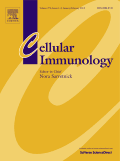
CELLULAR IMMUNOLOGY
Fostering Innovation in Immunological ScienceCELLULAR IMMUNOLOGY is a prestigious journal published by Academic Press Inc. Elsevier Science, dedicated to advancing the field of immunology. Established in 1970 and converging ongoing research up to 2024, this journal has carved out a significant niche within the academic community, boasting a notable Q2 ranking in the Immunology category and holding a respectable 67th percentile ranking within Scopus for its contributions to the disciplines of Immunology and Microbiology. The journal serves as a vital platform for disseminating high-quality research, reviews, and methodologies that elucidate the intricacies of cellular immune responses, thereby benefiting researchers, professionals, and students alike. Although it does not offer open access, the journal's impact is evidenced by its comprehensive coverage of pioneering studies and ongoing developments in the immunological sciences, positioning it as an essential resource for those seeking to deepen their understanding and engage with the latest findings in cellular immunology.
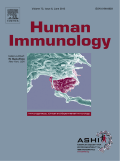
HUMAN IMMUNOLOGY
Fostering Knowledge in Immune Health and DiseaseHUMAN IMMUNOLOGY, published by Elsevier Science Inc, serves as a critical platform for disseminating research in the fields of immunology and allergy, as well as various aspects of miscellaneous medicine since its inception in 1980. With an ISSN of 0198-8859 and E-ISSN 1879-1166, this journal is pivotal for researchers and practitioners looking to advance their understanding of human immune responses and related conditions. The journal currently holds a respectable position within its field, as highlighted by its 2023 Scopus ranks—#114/233 in Immunology and Allergy and #132/236 in Immunology and Microbiology. Moreover, it maintains a Q2 quartile ranking in both Immunology and Allergy and miscellaneous Medicine, underscoring its influence and reach within the scientific community. Although it does not currently offer Open Access options, HUMAN IMMUNOLOGY remains dedicated to providing valuable insights and fostering academic discourse within its discipline, characterized by a rigorous peer-review process and a focus on innovative research trajectories.
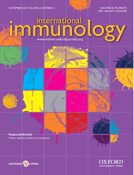
INTERNATIONAL IMMUNOLOGY
Advancing Immunological Insights for a Healthier Tomorrow.INTERNATIONAL IMMUNOLOGY, published by OXFORD UNIV PRESS, stands out as a premier journal in the field of immunology, providing a vital platform for disseminating groundbreaking research and innovative developments within the discipline. With an impressive Q1 ranking in Immunology and Allergy, as well as in Medicine (miscellaneous), it consistently showcases high-impact studies that contribute to the advancement of immunological knowledge. The journal spans over three decades, from its inception in 1989 to its ongoing contributions as of 2024, thus solidifying its reputation in the scientific community. Researchers, professionals, and students will find valuable articles that delve into the complexities of immune responses, therapeutic interventions, and emerging immunological paradigms, ensuring INTERNATIONAL IMMUNOLOGY remains at the forefront of knowledge in the life sciences.
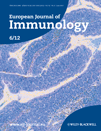
EUROPEAN JOURNAL OF IMMUNOLOGY
Cultivating Excellence in Immunology ResearchWelcome to the European Journal of Immunology, a premier peer-reviewed journal dedicated to advancing the field of immunology and allergy research. Established in 1971 and published by Wiley, this esteemed journal has been consistently ranked in the top quartile (Q1) across its categories, highlighting its significant impact within the scientific community. With an impressive Scopus ranking, the journal occupies the 64th position in Immunology and Allergy and the 74th in the broader sector of Immunology and Microbiology, demonstrating its vital role in driving innovation and knowledge in immunological studies. The European Journal of Immunology publishes high-quality original research, comprehensive reviews, and insightful commentary, making it an indispensable resource for researchers, healthcare professionals, and students dedicated to understanding the complexities of the immune system. Although not an open-access journal, it offers various subscription options to ensure that institutions and individuals can access pivotal research that shapes the future of immunology.

BMC IMMUNOLOGY
Bridging Gaps in Immune System UnderstandingBMC Immunology is a prominent open-access journal published by BMC that has been at the forefront of immunological research since its inception in 2000. Based in the United Kingdom, this journal aims to advance the understanding of immune system functions and disorders through high-quality, peer-reviewed articles. With an impressive scope encompassing various facets of immunology, BMC Immunology has earned a Q3 ranking in the Immunology category according to the 2023 category quartiles, demonstrating its growing impact and relevance in the scientific community. Researchers and professionals will find valuable insights in its array of published works, spanning both foundational studies and innovative applications. The journal's commitment to open access ensures that cutting-edge research is freely available, fostering collaboration and advancement in the field. For those looking to stay updated on the latest developments in immunology, BMC Immunology stands as an essential resource for researchers, professionals, and students alike.

ImmunoTargets and Therapy
Pioneering Discoveries in ImmunotherapyImmunoTargets and Therapy is a leading open access journal published by DOVE MEDICAL PRESS LTD, dedicated to advancing the field of immunology and its various therapeutic applications. Since its inception in 2012, the journal has rapidly become a vital resource for researchers, professionals, and students, achieving notable recognition with a Q1 ranking in both Immunology and Immunology and Allergy categories as of 2023. With an impressive Scopus ranking of #22 out of 233 in Medicine - Immunology and Allergy, and #25 out of 236 in Immunology and Microbiology, this journal maintains a 90th percentile standing in its field. ImmunoTargets and Therapy not only publishes original research articles, reviews, and clinical studies, but also fosters an inclusive platform for the dissemination of innovative findings critical to the fight against immunological disorders. Based in New Zealand, it serves a global audience, promoting knowledge exchange and collaboration through its open access model.
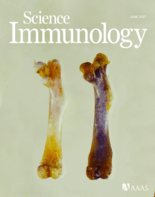
Science Immunology
Elevating Immunological Knowledge for Global ImpactScience Immunology, published by the American Association for the Advancement of Science, is a leading journal in the field of immunology, recognized for its significant impact and rigor in advancing our understanding of immune responses and complex diseases. With an impressive impact factor that places it in the Q1 category of both immunology and allergy, as well as miscellaneous medicine, this journal is ranked #7 and #8 in their respective Scopus categories, reflecting its high-quality research output. Since its inception in 2016, Science Immunology has been at the forefront of interdisciplinary immunological research, fostering crucial insights that link immunology with pressing health challenges. The journal is committed to providing open access to its content, ensuring that groundbreaking findings are accessible to a global audience of researchers, professionals, and students. Its anthology not only addresses fundamental immunological mechanisms but also enhances the dialogue on translational applications and therapeutic interventions, solidifying its position as an essential resource within the scientific community.

IMMUNOBIOLOGY
Fostering collaboration for impactful discoveries in immunobiology.IMMUNOBIOLOGY is a prestigious academic journal published by Elsevier GmbH that significantly contributes to the fields of hematology and immunology. With its ISSN 0171-2985 and E-ISSN 1878-3279, this journal has been disseminating impactful research since 1979, positioning itself at the forefront of immunological and hematological advances. The journal holds a commendable ranking of Q2 in Hematology and Q3 in both Immunology and Immunology and Allergy, indicating its relevance and influence within the scientific community, as reflected by its Scopus rankings. Although IMMUNOBIOLOGY operates under a subscription model, it remains dedicated to expanding knowledge across disciplines, fostering innovative research, and facilitating connections among researchers, professionals, and students. Situated in Munich, Germany, this journal is continually evolving and aims to remain an essential resource for the latest discoveries and insights in the realms of immunity and blood disorders, ultimately enhancing our understanding of complex biological systems.

CANCER IMMUNOLOGY IMMUNOTHERAPY
Elevating Understanding of Immune Responses in CancerCancer Immunology Immunotherapy, published by Springer, stands as a premier journal in the fields of cancer research and immunology, holding a prestigious Q1 ranking across multiple categories, including Oncology and Medicine as of 2023. With an ISSN of 0340-7004 and an E-ISSN of 1432-0851, this journal has been a pivotal platform for groundbreaking research since its inception in 1976, continuing to provide insight into the complex interactions between the immune system and cancer. The journal's scope encompasses a wide array of topics, including novel therapeutic strategies, immunological mechanisms, and translational science aimed at advancing treatment outcomes for cancer patients. Renowned for its rigorous peer-review process and high impact factor, it attracts contributions from leading experts and researchers around the globe, positioning itself among the top-tier publications with Scopus rankings that reflect its vital role in advancing the field. Access options are generally subscription-based, ensuring a comprehensive resource for professionals and academics seeking to deepen their understanding and make meaningful contributions to cancer immunotherapy.